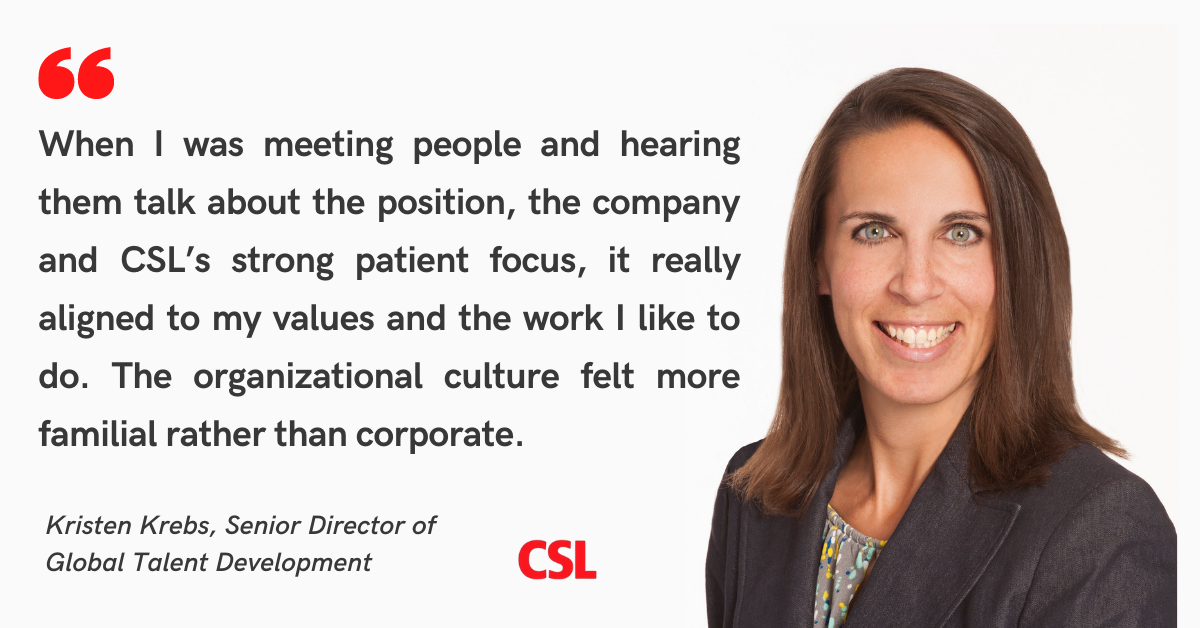As it turns out, that's exactly what she's doing right now as the Senior Director of Global Talent Development at biotechnology company CSL Behring.
"It feels like a dream role in that it covers a broad range of the talent development areas I love and I get to work on a global scale," says Kristen, who didn't know much about CSL Behring when their recruiters reached out. But as she learned about CSL's commitment to saving lives and improving quality of life for people with serious rare diseases, as well as their HR group's ongoing transformation, she knew she had to accept their offer.
We sat down with Kristen to learn more about her career trajectory, how she got into Industrial/Organizational psychology in the first place, and what it's like working at CSL, including what's changed at work as the world adjusts to living in an extended pandemic.
Finding her passion academically and in the job market
Kristen's work in talent development would be meaningful even if she didn't have an incredibly personal connection to it—but she does.
Her dad worked on Wall Street during the 80s in a very stressful job, and Kristen connects his untimely death at the age of 47 with the demanding environment he faced at work. "I've always felt that the stress of his job had a lot to do with the tax paid on his heart," she says. "That was a critically defining moment in my life"—she was a sophomore in college at the time—"and I realized through that traumatic experience that if I could dedicate myself to increasing the satisfaction and reducing the stress people experience at work, that would probably be pretty meaningful and rewarding to me."
She majored in psychology during undergrad, and after taking a class in Industrial/Organizational psychology her senior year, Kristen realized she wanted to continue studying in that subset of the field and applied to grad school. "I/O focuses on human behavior at the individual, team, and organizational levels. That's everything from putting somebody through a hiring process and onboarding them, to motivating them and helping them improve their performance. At the team level, it involves all aspects of helping teams become high performing. At the organizational level, it focuses on areas such as company culture, organizational design and change management," she explains. "It's a super degree that trained me to think big picture and work at both the macro enterprise level and micro individual level. It's also a very versatile degree in that I could have gone into many different areas of the HR function – I just chose to specialize in Talent Management based on what I'm most passionate about."
As Kristen worked to finish her dissertation, she joined a consulting firm and worked with various clients on their management practices and employee engagement issues. She loved the diversity of problems and people she worked with, but over time the travel began wearing on her and she realized she didn't like not being able to see the long term effects of her projects. "I got sick of going into companies, making lots of recommendations and getting new things started, and then not getting to see how the changes and improvements actually played out in the company after the project was finished," she says.
Kristen knew she wanted to find an in-house role, but her particular area of consulting made it clear that she didn't want to work just anywhere. "I was doing employee engagement work so I really saw the underbelly of every organization I worked with. I knew all of their pluses and minuses. And there were really no clients that I would want to work for, except for one that stood out above all of the rest," she says.
She called that client, a joint venture pharmaceutical company that is now part of Takeda, to let them know that she was looking for a new role and asked if they had any positions she could apply for. As it turned out, they were just creating a new position focused on leadership development. Kristen went in for the interview, got it, and stayed at that company 8 years until she and her husband decided to move back to the east coast to be closer to family. She found a job leading leadership development at another pharmaceutical company and stayed for several years, taking on new roles that expanded her responsibilities globally into performance management, career development and succession planning. Although she loved the work, during that time the company was acquired and as the culture changed for the worse, she realized she needed to move on. That's right when CSL Behring came calling.
Directing global talent through a global pandemic
Kristen says that interviewing with CSL felt like she'd found a dream role that brought together many of the areas she is passionate about. "When I was meeting people and hearing them talk about the position, the company and CSL's strong patient focus, it really aligned to my values and the work I like to do. The organizational culture felt more familial rather than corporate," says Kristen.
The role itself, which involved leading an internal transition to create a global Talent Development team, was a perfect complement to Kristen's experience and ambition. "It was just a phenomenal opportunity to come into HR at a time when they were still building. I could really help shape what the talent development space would look like and create a global function for the organization," she says.
Kristen spent the first few years in her role shaping that transition, which officially went live in January 2020. She had just a few months to enjoy it before a whole new priority took over: preparing to transition CSL's workplace and their talent development programs into a completely virtual world.
"Our team sprang into action—we have a fantastic team across the globe who are highly collaborative and always willing to go the extra mile—and the way they handled everything when the pandemic hit was impressive," says Kristen. We quickly pulled together online resources and delivered virtual courses on timely topics such as working remotely, managing virtual teams, dealing with change and uncertainty, and emotional intelligence, to name a few.
We also needed to quickly convert existing training to virtual, which was relatively straightforward to redesign, she explains; they just had to figure out how to adjust their in-person programs to fit a virtual setting, and in fact had already started experimenting, pre-COVID, with ways to do that, in order to offer more scalable and flexible training opportunities and achieve better ROI. Previously, they had experienced a problem with participant cancellations when other work priorities came up that would often leave facilitators teaching to half empty classrooms. Now, explains Kristen, CSL facilitators in Switzerland, Germany, Australia, and across the U.S. offer trainings at various times for employees around the world. "This gives employees more class options to choose from and it's ultimately a better learning experience, because participants hear from each other and learn about different parts of the business, different cultures and different perspectives. It's also great for the facilitators to be exposed to that," says Kristen.
Kristen's team is also responsible for all of CSL's onboarding, but that wasn't as straightforward to transition to a virtual experience in some parts of the world, particularly in the first few days after everything shut down and the U.S. Department of Homeland Security hadn't revised the stipulations for how a new hire's legal documents needed to be handled in a virtual world. "That was a little trickier," says Kristen, smiling.
In the end, the U.S. stipulations were revised and Kristen's team was able to adapt to digital processes for now. As the return-to-office date continues to shift for CSL and many other companies, Kristen and her team have stayed agile, updating their training playbooks and creating plans for whatever future awaits.
"It's important to keep all of what's going on in perspective," says Kristen. "We will come out fine on the other side. We just have to stay focused and flexible."
If you're interested in learning more about CSL, visit their PowerToFly page here.




